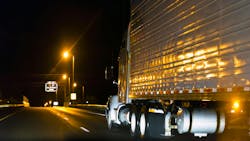With the change in administration in Washington, we are entering uncertain times. I am not going to get into a political debate here, suffice it to say every time there is a change in administration at the federal level, there are changes in laws, policies, and practices that can impact the trucking industry. There are a host of issues including tariffs and clean energy legislation and incentives that will play out over the next four years. It is too soon to say what the changes will be or how they will impact trucking, but we can be assured that things will be different as we move from one administration to another.
But regardless of what comes out of Washington, the trucking industry needs to continue doing what it has always done—deliver goods to businesses and consumers in a manner that ensures people have what they need while also ensuring profitability for trucking companies.
And I think that regardless of policy changes, we need to continue our efforts to move those goods in the most efficient manner possible. That could include things like improving the mpg of diesel-powered trucks by adding aerodynamic devices, switching to low rolling resistance tires, monitoring tire pressure, downspeeding the engine, resetting engine parameters for fuel economy, teaching drivers to operate the vehicle with fuel efficiency in mind, and more.
See also: DOE awards millions of dollars to fund heavy-duty EV charging projects in California, Arizona, Utah
It also can include beginning to investigate some of the alternative powertrain solutions that are now on the market to see which of them you might be able to incorporate into your operation. It doesn't have to be all or nothing when it comes to alternative powertrain solutions. For example, if you operate terminal tractors, you should seriously consider switching to battery-electric versions of those vehicles. Terminal tractors are one of the best-use cases for battery electric vehicles and a great first step for fleets to learn about adding BEVs to their operation. At the same time, the vehicles you use over long-haul routes could continue to be powered by diesel.
Aside from BEVs, there are other powertrain options to consider, including renewable fuels, compressed natural gas, renewable NG, hybrids, hydrogen internal combustion engines, and hydrogen fuel cells. There are fleets that are currently deploying these alternatives, and we will feature some of them in Run on Less – Messy Middle this fall so that you can have a real-world look at how they work in long-haul applications.
My point here is that regardless of what happens in Washington, trucking fleets need to continue to work on making their operations more efficient. In addition, I think we need to keep in mind trucking’s impact on the environment and try to do what we can to lessen that impact while still operating profitably.
We’ve already made great strides in this area over the last several decades, and I am confident we can continue our journey toward a cleaner freight future in a way that makes sense for shippers, fleets, and the environment.
About the Author

Michael Roeth
Executive Director
Michael Roeth is the executive director of the North American Council for Freight Efficiency. He serves on the second National Academy of Sciences Committee on Technologies and Approaches for Reducing the Fuel Consumption of Medium and Heavy-Duty Vehicles and has held various positions with Navistar and Behr/Cummins.
